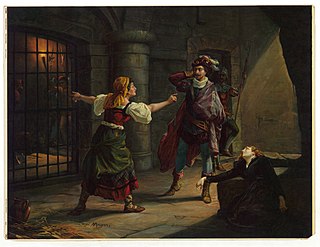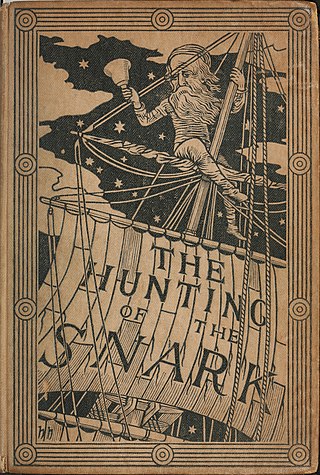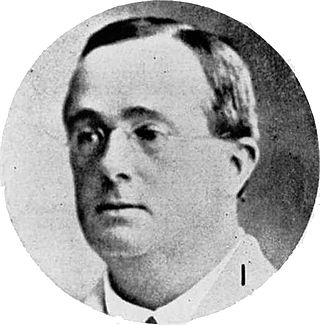
Il trovatore is an opera in four acts by Giuseppe Verdi to an Italian libretto largely written by Salvadore Cammarano, based on the play El trovador (1836) by Antonio García Gutiérrez. It was García Gutiérrez's most successful play, one which Verdi scholar Julian Budden describes as "a high flown, sprawling melodrama flamboyantly defiant of the Aristotelian unities, packed with all manner of fantastic and bizarre incident."

The Hunting of the Snark, subtitled An Agony, in Eight fits, is a poem by the English writer Lewis Carroll. It is typically categorised as a nonsense poem. Written between 1874 and 1876, it borrows the setting, some creatures, and eight portmanteau words from Carroll's earlier poem "Jabberwocky" in his children's novel Through the Looking-Glass (1871).

A libretto is the text used in, or intended for, an extended musical work such as an opera, operetta, masque, oratorio, cantata or musical. The term libretto is also sometimes used to refer to the text of major liturgical works, such as the Mass, requiem and sacred cantata, or the story line of a ballet.

Sir Reginald Edward Stubbs was a British colonial governor, who was once the Governor of Hong Kong. He caused controversy while Governor of Ceylon over the Bracegirdle Incident.

Sir Claud Severn (1869–1933) was a British colonial administrator. Severn joined the colonial civil service in British Malaya in 1894 and worked under the Governor of the Straits Settlements. In 1912, he became Colonial Secretary of Hong Kong and remained in the post until 1925. During this period, Severn governed Hong Kong twice as acting administrator during transition periods between Governors.

The Elder Conservatorium of Music, also known as "The Con", is Australia's senior academy of music and is located in the centre of Adelaide, the capital of South Australia. It is named in honour of its benefactor, Sir Thomas Elder. Dating in its earliest form from 1883, it has a history in professional training for musical performance, musical composition, research in all fields of music, and music education. The Elder Conservatorium of Music and its forerunners have been parts of the University of Adelaide since the early 1880s.

Ernst Johann Eitel or alternatively Ernest John Eitel was a German-born Protestant who became a notable missionary in China and civil servant in British Hong Kong, where he served as Inspector of Schools from 1879 to 1896.
Thomas William Shapcott is an Australian poet, novelist, playwright, editor, librettist, short story writer and teacher.

Lorenzo Da Ponte was a Venetian, later American, opera librettist, poet and Roman Catholic priest. He wrote the libretti for 28 operas by 11 composers, including three of Mozart's most celebrated operas: The Marriage of Figaro (1786), Don Giovanni (1787), and Così fan tutte (1790). He was the first professor of Italian literature at Columbia University, and with Manuel Garcia, the first to introduce Italian opera to America. Da Ponte was also a close friend of Mozart and Casanova.
Graeme John Koehne, is an Australian composer and music educator. He is best known for his orchestral and ballet scores, which are characterised by direct communicative style and embrace of tertian harmony. His orchestral trilogy Unchained Melody, Powerhouse, and Elevator Music makes allusions to Hollywood film score traditions, cartoon music, popular Latin music and other dance forms.
Martin Wesley-Smith was an Australian composer with an eclectic output ranging from children's songs to environmental events. He worked in a range of musical styles, including choral music, operas, computer music, music theatre, chamber and orchestral music, and audiovisual pieces which bring words, music and images together. He often worked with his librettist brother, Peter Wesley-Smith.

Raymond Wacks is Emeritus Professor of Law and Legal Theory at the University of Hong Kong, where he was Head of the Department of Law from 1986 to 1993. He was previously Professor of Public Law and Head of the Department of Public Law at the University of Natal in Durban. He retired at the end of 2001, and now lives in Lincolnshire.

Uthal is an opéra comique in one act by the French composer Étienne Méhul. The libretto, by Jacques-Benjamin-Maximilien Bins de Saint-Victor is based on the Ossian poems of James Macpherson. It was first performed at the Opéra-Comique in Paris on 17 May 1806. Méhul tried to give the work a dark "Scottish" atmosphere by eliminating the violins from the orchestra and replacing them with violas.

Michael Burden, FAHA, is an Australian musicologist, working in the United Kingdom. He was elected a Corresponding Fellow of the Australian Academy of the Humanities in 2018.
Gerald English was an English tenor. He performed operatic and concert repertoire, was a recording artist, and was a sometime academic.
Peter Richard Tahourdin was an English-born Australian composer. His compositions range from orchestral and chamber music to choral and educational music, as well as music for the opera and ballet. Without being his principal contribution, he was one of the pioneers in the field of electronic music.

James William Norton-Kyshe (1855–1920) was a British barrister and legal author. The Registrar of the Supreme Court of Hong Kong from 1895 to 1904, he published a number of law books including the compendious and oft-cited History of the Laws and Courts of Hong Kong (1898).
Moira Macdonald is an Australian-born entertainer and singer. She was a member of an à cappella group, Polyphony, which later became the Phones, "…one of the best live acts in Australia". The Phones toured Australia and appeared on national TV, including, Hey Hey It's Saturday and Midday with Ray Martin.
David Graham Miller is an Australian collaborative pianist. Along with Geoffrey Collins he was nominated for the 1990 ARIA Award for Best Classical Album for their album Flute Australia Volume 2 (2MBS-FM). He performed on the first full recording of Boojum by Peter and Martin Wesley-Smith with Sydney Philharmonia motet choir. With baritone Michael Halliwell, Miller released Soldier, Soldier: The Barrack-Room Ballads Of Rudyard Kipling. In 2013, Miller recorded Echo: the songs of Horace Keats for ABC Classics with soprano Wendy Dixon, baritone John Pringle and violinist Marina Marsden, performing the songs of the Australian composer Horace Keats. He continues to regularly record for Wirripang Records and perform with Charisma and Grevillea ensembles.
Katherine Elizabeth Firth is a British-Australian poet and librettist. She is the inaugural Head of Lisa Bellear House in the University of Melbourne. She previously was Academic Coordinator at International House, University of Melbourne, a university lecturer at La Trobe University, Melbourne, and a research associate at Trinity College Theological School, Melbourne, the theological college of the Anglican Province of Victoria.












